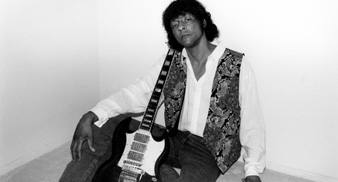Arthur Lee, founder of Love, the Sixties psychedelic folk rock band whose Forever Changes album is one of the decade’s finest, has died, aged 61. Lee passed away yesterday (August 3) after battling leukemia. Arthur Lee was born Arthur Taylor Porter in Tennessee in 1945. His family moved to LA and in his late teens, he formed a series of groups whose styles ranged from R&B to surf music. In 1965, Lee experienced an epiphany on hearing The Byrds. He began auditions for a new band, which would eventually become Love - among the first racially mixed rock groups. Love would later declare himself “the first black hippie.” Despite their folk/rock influences and their ostensible, psychedelic mellowness, Love were deceptive and full of acid twists; songs like their 1966 near-hit, the punkish, explosive “Seven And Seven Is” and “The Red Telephone”, with its fadeout foreboding of totalitarianism were apocalyptic, divining a mushroom cloud in 1967’s silver lining. Surly and strung out on heroin, Love fell apart at their height. 1967’s Forever Changes is their masterpiece. They fatally passed up the chance to play the Monterey festival that year and slid into decline. A solo career saw Lee dabble unsuccessfully in soul, then disappear before re-emerging in the 90s to bask in the retrospective adoration of those who recognised the importance of Love’s fractured, squandered, brilliant legacy. Lee’s final years were blighted by a 1996 jail sentence for possessing a firearm but he was released in 2001 to tour the world with a reincarnation of Love. Following his diagnosis with leukaemia in April 2006, a benefit concert was arranged, featuring Robert Plant, Yo La Tengo and Ryan Adams, a roster whose span reflects the diverse range of Arthur Lee’s godlike influence. By David Stubbs
Arthur Lee, founder of Love, the Sixties psychedelic folk rock band whose Forever Changes album is one of the decade’s finest, has died, aged 61. Lee passed away yesterday (August 3) after battling leukemia.
Arthur Lee was born Arthur Taylor Porter in Tennessee in 1945. His family moved to LA and in his late teens, he formed a series of groups whose styles ranged from R&B to surf music. In 1965, Lee experienced an epiphany on hearing The Byrds. He began auditions for a new band, which would eventually become Love – among the first racially mixed rock groups. Love would later declare himself “the first black hippie.”
Despite their folk/rock influences and their ostensible, psychedelic mellowness, Love were deceptive and full of acid twists; songs like their 1966 near-hit, the punkish, explosive “Seven And Seven Is” and “The Red Telephone”, with its fadeout foreboding of totalitarianism were apocalyptic, divining a mushroom cloud in 1967’s silver lining. Surly and strung out on heroin, Love fell apart at their height. 1967’s Forever Changes is their masterpiece. They fatally passed up the chance to play the Monterey festival that year and slid into decline.
A solo career saw Lee dabble unsuccessfully in soul, then disappear before re-emerging in the 90s to bask in the retrospective adoration of those who recognised the importance of Love’s fractured, squandered, brilliant legacy. Lee’s final years were blighted by a 1996 jail sentence for possessing a firearm but he was released in 2001 to tour the world with a reincarnation of Love. Following his diagnosis with leukaemia in April 2006, a benefit concert was arranged, featuring Robert Plant, Yo La Tengo and Ryan Adams, a roster whose span reflects the diverse range of Arthur Lee’s godlike influence.
By David Stubbs



